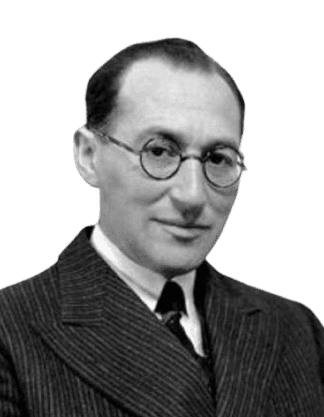Life and achievements
Early life
Kurt Lewin was born to a middle-class Jewish family on September 9, 1890, in Mogilno, Prussia. His father was a general store owner and had a small farm. Lewin grew up with the principles of hard work and being a responsible member of society. With his family, Lewin relocated to Berlin in 1905 and joined the Gymnasium, where he received classical humanistic education. At first, Lewin wanted to study medicine, but in 1909, he started his university education in Freiburg and in 1910 transferred to Munich to study biology. It was during this period that he joined socialist and feminist movements, which were to shape his future writing on social reform.
Lewin experienced a further change in his academic interests when he joined the University of Berlin to study philosophy and psychology. There, he got to know the new field of Gestalt psychology, which assumed that mind and behavior are integrated wholes. He finished his Ph.D. in 1916 under the tutelage of Carl Stumpf. His education was interrupted by the First World War, during which Lewin was enlisted in the German army and injured. This significantly impacted his understanding of people's actions and aggression, which set the basis for his subsequent studies on groups and their leaders.
Legacy
Kurt Lewin's work has been applied in psychology, education, management, and organizational development. He is often referred to as the father of social psychology since his works formed the basis for analyzing the effects of social factors on the behavior of groups and individuals. Lewin's field theory, force field analysis, and action research changed how psychologists and social scientists studied behavior. His formula, B = ƒ(P, E), still forms the basis of exploring the relationship between personality and environment in determining behavior.
Lewin's contribution is equally important in leadership theory. He conducted research on leadership types: autocratic, democratic, and laissez-faire leadership, and how each affects the group's performance and morale. This research became fundamental for organizational psychology and leadership training programs worldwide. His work on group dynamics introduced the idea that group behavior is more than the sum of individual behaviors, a concept still applied in business, education, and conflict management.
Apart from psychology, Lewin's legacy is also seen in his commitment to social justice and applied research. He believed the psychologist's role was to analyze and transform society. His contribution to action research, a process where the researcher participates in solving social issues, is still widely used today, particularly in education and community development. Lewin's scholarly work, practice of scientific research, and social application make his works applicable to contemporary society.
Milestone moments
Jun 13, 1916
Ph.D. in Psychology
Kurt Lewin got his Ph.D. in psychology in 1916 from the University of Berlin with Carl Stumpf as his supervisor.
His dissertation was on will, motivation, and associations, which later formed the basis of the field theory he developed.
Lewin's early work was the foundation for his transition from behavioral psychology to Gestalt psychology, in which he started focusing on the holistic nature of perception and action.
This was the beginning of Lewin's academic career, which, later in life, led to his significant contribution to social psychology.
Jan 18, 1933
Out-migration to the United States
When the Nazis came to power in Germany in 1933, Lewin decided to flee, and he moved to the United States, where he joined Cornell University.
With the forced migration from Germany, a turning point in his life, Lewin's research focused on groups and social problems.
It was in the U.S. that he started formulating his concepts of leadership, group dynamics, and the relationship between the person and the environment.
This step helped Lewin avoid repression and further develop his research in a friendly academic setting.
Jun 6, 1939
Leadership Styles Experiment
Lewin, in 1939, did a leadership styles experiment with Ronald Lippitt and Ralph White.
School children were grouped into three groups, with one group assigned an authoritarian leader, the second group assigned a democratic leader, and the third group assigned a laissez-faire leader, to see the impact of the different types of leadership on the group.
In his study, Lewin and his colleagues discovered that democratic leadership enhanced group cohesiveness and promoted better results than authoritarian and laissez-faire leadership styles.
This experiment became a reference in Organizational Behavior and Leadership training.
Jan 10, 1944
Formation of the Research Center for Group Dynamics at MIT
In 1944, Lewin established the Research Center for Group Dynamics at MIT, where he concentrated on the dynamics of groups, decision-making, and social change.
This research center evolved into a hub for small group dynamics, leadership, and communication studies, attracting scholars from around the world.
Lewin's work at MIT entrenched him as the leading social psychologist and helped to advance the concepts of action research and organizational development.
He did not limit himself to psychology alone but also contributed to other disciplines such as management, education, and social work.
